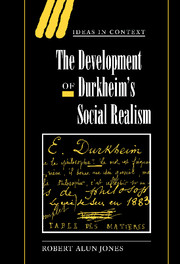Book contents
- Frontmatter
- Contents
- Acknowledgments
- Note on texts and references
- Introduction: sociology and its history
- Chapter 1 The reform that contained all other reforms
- Chapter 2 The subtlety of things
- Chapter 3 The perfection of personality
- Chapter 4 A l'école des choses
- Chapter 5 The yoke of necessity
- Conclusion: sociology and irony
- List of references
- Index
- Ideas in Context
Chapter 1 - The reform that contained all other reforms
Published online by Cambridge University Press: 22 September 2009
- Frontmatter
- Contents
- Acknowledgments
- Note on texts and references
- Introduction: sociology and its history
- Chapter 1 The reform that contained all other reforms
- Chapter 2 The subtlety of things
- Chapter 3 The perfection of personality
- Chapter 4 A l'école des choses
- Chapter 5 The yoke of necessity
- Conclusion: sociology and irony
- List of references
- Index
- Ideas in Context
Summary
“When a people has achieved a state of equilibrium and maturity,” Durkheim observed in his seventh lecture on moral education, “when the various social functions, at least temporarily, are articulated in an ordered fashion, when the collective sentiments in their essentials are incontestable for the great majority of people, then the preference for rule and order is naturally preponderant.” It was this moral situation, for example, that had characterized Rome under Augustus, and France under Louis XIV. By contrast, “in times of flux and change, the spirit of discipline cannot preserve its moral vigor since the prevailing system of rules is shaken, at least in some of its parts. At such times, it is inevitable that we feel less keenly the authority of a discipline that is, in fact, attenuated” (1961: 100–1).
Durkheim had no illusions about the type of society or historical period in which he was living: “Now,” he emphasized, “we are going through precisely one of these critical phases. Indeed, history records no crisis as serious as that in which European societies have been involved for more than a century. Collective discipline in its traditional form has lost its authority, as the divergent tendencies troubling the public conscience and the resulting general anxiety demonstrate. Consequently, the spirit of discipline itself has lost its ascendancy” (1961: 101). As we shall see, this was the problem for which Durkheim's solution was social realism.
- Type
- Chapter
- Information
- The Development of Durkheim's Social Realism , pp. 9 - 44Publisher: Cambridge University PressPrint publication year: 1999



